Muslims
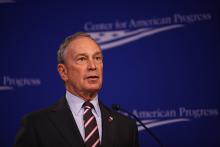
Muslim-American civil rights groups are criticizing New York City Mayor Michael Bloomberg for vetoing a bill on Tuesday that would have created an independent inspector general to oversee the New York City Police Department.
The New York City Council passed the bill June 27 as a check against controversial NYPD policies that critics say violate the civil rights of Muslim and other minority New Yorkers. Reports that the NYPD spied on mosques, Muslim businesses, organizations, and students began surfacing in 2011.
“The NYPD is out of control and discriminates against innocent Americans, and Mayor Bloomberg has let Americans down by allowing the NYPD to use discriminatory policies without any accountability,” said Glenn Katon, legal director for Muslim Advocates, a civil rights group based in San Francisco.

Conversations in Transition is a veritable graduate course in what South Africans call ubuntu, or good neighborliness.
Charles Villa-Vicencio and Mills Soko present 23 narratives of both well-known and unsung heroes of the anti-apartheid struggle. These narratives are filled with instructive words of wisdom for seekers of peace with justice in countries emerging from post-tyranny chaos and in long-established democracies alike. Historians and activists will find hope in the stories of South Africa’s courageous, diverse citizens, as well as prophetic insights and warnings as the subjects address post-apartheid violence and oppression in a country still on the edge.
My own experiences lead me to an unqualified endorsement of this invaluable compendium. Over several decades I have pondered repeatedly two particular conversations, one with a Jew in Israel and the other with a Muslim from Cape Town.
An effort was made to introduce the Truth and Reconciliation Commission (TRC) process into the Israel-Palestine conflict. At the end of an evening with South African officials and members of the Israeli and Palestinian communities, the director of a Jewish study center in West Jerusalem, Benjamin Pogrund, shared a revealing comment. He said, “TRC will never work here because Israelis do not have the theological and philosophical understanding of forgiveness and reconciliation that Muslims, Christians, and Jews shared in South Africa in order to bring unity and liberation without major conflict.”

WHEN I WAS growing up in the western suburbs of Chicago, I felt so far outside of the inner circle of cool kids that I didn’t even know where the circle was. So you can imagine my delight when I got an invitation to David’s birthday party. David was in the outer part of the inner circle, which meant I was heading in the right direction.
A couple days before the party, my mom took a closer look at the invitation and noticed that it said David’s parents would be making hot dogs for lunch. As she wasn’t sure whether the hot dogs were pork or beef, and as we were Muslims who don’t eat pork, she informed me that she’d be giving me all-beef franks to take from home with a note to David’s mom asking her to fry them up in a separate pan.
Of course, this horrified me, the kind of horror that only a kid caught up in the jungle of grade school coolness competition can feel. I remember standing in the living room, staring at my mom, and thinking to myself: “First, you named me Eboo.”
The day of the party rolled around and, dutiful Indian-Muslim child that I was, I accepted the little plastic baggie with two beef hot dogs that my mom handed me, allowed her to put me in nice slacks and a collared shirt, and went off to the party. When lunchtime came, I snuck into the kitchen to make my request of David’s parents. Imagine my surprise when I noticed another kid in the kitchen. He wore a collared shirt and nice slacks and also held a plastic baggie with two hot dogs.
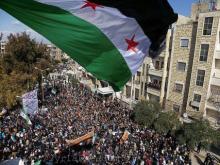
The Syrian civil war is increasingly drawing in nations across the Middle East, a regionwide conflict that threatens to pit world powers against each other and Muslim against Muslim.
On Wednesday, the United Nations Human Rights Council pushed through a resolution to investigate the abuses of the Syrian regime, over the objections of the regime’s ally Russia, who insisted the West was making matters worse.
U.S. Secretary of State John Kerry continued his travels in the region, trying to get all parties to agree to a peace conference in Geneva in the next few weeks. But councils representing the Syrian rebels again refused to join, demanding that representatives of Bashar Assad’s regime be banned.
In a war that is now clearly pitting the two main branches of the Islam — Sunni and Shiite Muslims — against one another, the dithering and differences between world powers is bringing about a desperate situation, according to experts.
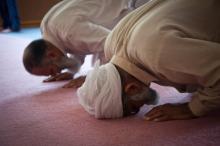
Muslims in America are much less inclined to support suicide bombing than other Muslims abroad, and are more likely to believe that people of other faiths can attain eternal life in heaven, according to a new report released Tuesday by the Pew Forum on Religion & Public Life.
“The World’s Muslims” report looks at Muslim views across seven categories: Islamic law; religion and politics; morality; women; relations among Muslims; interfaith relations; and religion, science, and pop culture. There is also a special section on U.S. Muslims.
Of the countries surveyed, only a majority of Muslims in America — 56 percent — believe people of other faiths can go to heaven; by contrast, that figure among U.S. Christians is about 64 percent. U.S. Muslims are also less likely than Muslims abroad to believe in evolution, sharing views that are closer to those of U.S. Christians.
On suicide bombing, 81 percent of U.S. Muslims said it was never justified, 7 percent said it was justified to “defend Islam,” and 1 percent said it was “sometimes justified.”
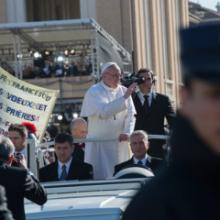
VATICAN CITY — Pope Francis on Friday called for more intense dialogue between religious leaders, particularly Muslims, as he tries to recalibrate relations between the world’s two largest religious groups.
Speaking in the Vatican’s majestic Sala Regia, the Argentine pontiff said that part of his mission is to connect “all people, in such a way that everyone can see in the other not an enemy, not a rival, but a brother or sister.”
In a meeting with Vatican diplomats and foreign leaders, Francis also reaffirmed the church’s commitment to protect the poor and the environment, an early theme in his young pontificate.
“Fighting poverty, both material and spiritual, building peace and constructing bridges: these, as it were, are the reference points for a journey that I want to invite each of the countries here represented to take up,” the pope said.
WHO SHOULD BE able to pray at a presidential inauguration and what should that prayer be?
On Jan. 20, 1937, Monsignor John A. Ryan delivered the first inaugural benediction at the inauguration of Franklin D. Roosevelt with these words: "Almighty God, ruler of nations, we beseech thee to bless the people of the United States. Keep them at peace among themselves and in concord with all other peoples. Cause justice and charity to flourish among them, that they may all be enabled to live as persons created in thine own image and likeness."
Since this first benediction, ministers, priests, bishops, cardinals, and rabbis have offered prayers at the past 18 presidential inaugurations. Almost 76 years to the day since Father Ryan's benediction, Myrlie Evers-Williams became the first layperson to deliver the inaugural invocation, and Rev. Luis León, an Episcopal priest, offered his prayer for President Obama and our nation: "... with the blessing of your blessing, we will see that we are created in your image, whether brown, black, or white, male or female, first-generation immigrant American or daughter of the American Revolution, gay or straight, rich or poor ... with your blessing we will recognize the abundance of the gifts of this good land with which you have endowed this nation."
You may remember that the selection of Rev. León, like most decisions made in Washington today, did not come without controversy and an onslaught of protests. León, who ministers at St. John's Church near the White House and is known for welcoming openly gay Christians, replaced the administration's first choice, Rev. Louie Giglio. Giglio withdrew from the ceremony after the surfacing of his controversial sermon from 20 years ago condemning gay relationships. Giglio's stance on the issue of gay marriage is in sharp contrast to the beliefs of Rev. León, whose parish will begin to bless same-sex partnerships and ordain transgender priests this summer.
Muslim and civil rights organizations say a New York Police Department program to secretly monitor Islamic communities has created so much fear and suspicion among Muslims that many find it impossible to lead normal lives.
A new 56-page report, “Mapping Muslims: NYPD Spying and its Impact on American Muslims,” details how the NYPD’s covert surveillance caused Muslims to refrain from activism and change their appearance so as not to appear too Muslim, and sowed suspicion among community members.
As a result, the Monday report asserts, trust between Muslims and police has broken down. The program, in which NYPD policemen secretly visited mosques, Muslim-owned businesses, and student and civic associations beyond New York’s five boroughs, was established in 2001 but uncovered by The Associated Press in 2011.
A spokesperson for the NYPD did not respond to a request for comment.
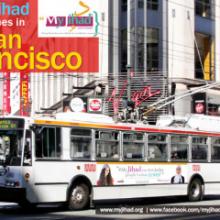
An ad campaign on San Francisco buses is aimed at trying to change public perception of the word “jihad,” which the program’s founder says has been distorted by extremists — Muslim and anti-Muslim alike.
Ahmed Rehab, a 36-year-old political activist, started the campaign in Chicago in December and expanded it to 25 San Francisco buses at the start of the year.
Rehab, who heads the Chicago office of the Council on American-Islamic Relations, says his MyJihad campaign, which defines jihad as a personal struggle in many areas of life, is aimed at reframing a debate over a word that has become synonymous in many quarters with armed struggle and terrorism.
He said the debate has been taken over “more or less by two extremes — Muslim extremists and anti-Muslim extremists.”
DOES THE RIGHT to free speech include the right to yell “Fire!” in a crowded social network?
That’s one of the questions raised by the violent overreaction by some Muslims to the 14-minute YouTube video clip, Innocence of Muslims.
Of course, my question paraphrases the words of Supreme Court Justice Oliver Wendell Holmes in deciding that speech likely to cause immediate violence could be restricted. However, over the course of the 20th century, the American standard for limiting potentially harmful speech has gotten a lot tougher. For the past 50 years or so, it’s been settled law in the U.S. that the First Amendment protects speech that is, like Innocence of Muslims, false, hateful, malevolent, and even very badly written, acted, and produced. But the Internet Age is bringing new challenges to America’s free-speech fundamentalism.
Tolerance of blasphemous, racist, and defamatory material is commonplace to most Americans. We take it as one of our God-given rights. But, in fact, this is a real example of American exceptionalism. No other liberal democracy in the world protects speech that is plainly intended to wound and insult members of a specific racial or religious group. “Hate speech” prohibitions are the rule throughout the Western world.
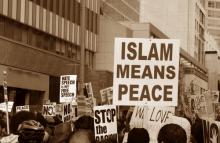
AS I WRITE this, the top story on The New York Times website reads “Anti-American Protests Over Film Expand to More than a Dozen Countries.” The slideshow includes images of angry young men with their fists in the air and masks over their faces protesting on dusty streets filled with riot police and open fires. As if Americans’ view of Muslims was not dark enough.
The film in question is the 14-minute YouTube clip called Innocence of Muslims that portrays the Prophet Muhammad as a buffoonish clown and even a child molester. It was created and promoted by individuals with a long history of anti-Muslim activities, who were perfectly aware that it would provoke a small segment of Muslims around the world to violence. And it is now that violent response that is defining the Muslim world to many people—just as in the case of the attacks of 9/11 and the riots provoked by the Danish cartoons in 2005. As @TheBigPharoah said on Twitter: “The sad thing is that those who attack embassies are like hundreds, barely a thousand. Millions are tarnished by what they do though.”
It is impossible to overstate how frustrating it is to be constantly represented by violent thugs and to be asked to explain their actions. Here is the question one African-American seminary student I recently met asked me over email: “Why do so many Muslims ... become so enraged when someone from the West deliberately breaks an Islamic rule they take as offensive?”
LOS ANGELES — Unshaven and wearing a black hoodie and cap, Omar Elba looked out from the lectern, surrounded by a gold cross and organ pipes. "Moses, you are my nizzle fo' shizzle," said the Egyptian-born Muslim comedian, doing his best to channel Snoop Dogg.
It's a joke he's done before, but never in a church.
The unique setting of their performance inside Westwood Hills Congregational Church wasn't lost on any of the performers at the Sultans of Satire comedy show. Yet the sacred stage didn't keep them from swearing or talking about sex, although it inspired more jokes about growing up Jewish, Muslim, and Christian than one might typically hear during stand-up.
"I don't know whether to tell jokes or tell you my confessions," Elba said, opening up the show.

A house of worship in Ohio was hit by an arsonist this weekend, causing an estimated million dollars in damage. Services were rescheduled, members toured the building to see the destruction, and statements were made. The religious community felt targeted and was afraid of future attacks.
The fact that the space in question was the Islamic Center of Greater Toledo should not change our outrage. As Christians, we need to stand for religious liberty for people of all faiths. We need to love our neighbors and speak out against hate.
Soon after this weekend’s attack was made public, we put a plan into action to demonstrate our solidarity. As we have done in Missouri, Tennessee, and New York, we will be offering a simple, biblical message: “Love your Muslim neighbors.”
WHEN AMBASSADOR Chris Stevens and other embassy staff were killed in Benghazi in September, it struck close to home for us at Sojourners. The last time a U.S. ambassador was slain was in 1979, when Adolph Dubs, the American ambassador to Afghanistan, was kidnapped by Islamic extremists and later killed. His daughter, Lindsay Dubs, was Sojourners’ managing editor. The degrees of separation between world events and the home front are often slim.
Some attributed last month’s violence in the Middle East to “fanaticism,” a “blind and tragic barbarism” by “imbeciles.” Others used words such as “beyond pathetic,” “fringe,” and “extremists.”
Those descriptions were applied to both those who created the anti-Islam video that provided the spark, and those who used the hateful video as a reason, or excuse, to engage in violent protests against the United States and the “West,” including Israel.
The media repeatedly summarized the cause of the violence as resting in the intentionally offensive video, and said that Muslims, angered by the blasphemous depiction of the Prophet Muhammad, rioted in a blind and uncontrollable rage. Moustafa Bayoumi, writing for the Middle East Research and Information Project, described the process: “Islamophobes provoke. Too many Muslims respond. Non-Muslims believe Muslims are crazy. Muslims are told the West hates them, and the Islamophobic right sleeps well at night with their cozy dreams of a mission accomplished.”
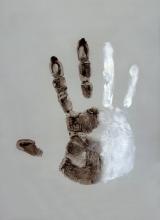
RACE WAS THE issue that changed the direction of my life. Growing up in Detroit in the early 1960s, the realities of white racism upended the world and church that I lived in.
What I saw and heard as a teenager painfully showed me that something was terribly wrong with my country and my religion. Trying to confront it got me virtually kicked out of my childhood church, led me into the civil rights and student movements, introduced me to the black churches, and set me on a path that would eventually bring me back to the good news of the gospel of Jesus Christ—which calls for social, racial, and economic justice. The historical tragedy, the “original sin,” of white racism in the United States is still a fundamental starting point to how I see the world.
So when I look at this election involving the first African-American president in U.S. history, I can’t help but go back to the critical questions of race. Let me be clear: To disagree with policies of President Obama and his administration is not racist. Agreements and disagreements are just that, and should not be correlated to race. And regardless of how we vote, we should all appreciate the fact that the role model of the Obama family living in the White House has convinced millions of young black men and women, and youth of all races—many for the first time—that they are really a part of this country and that they too could someday be president of the United States.
But I am concerned about how race has again distorted our politics. I want to speak directly to what those racial politics are and how people of faith should call them out and oppose them, no matter how we vote or what we think of the policies of the president.
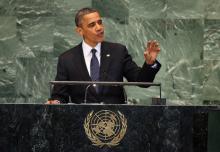
President Obama on Tuesday gave a forceful speech at the United Nations, in which he challenged much of the world's assumptions about free speech and religion.
Here are five points from his address, which together, add up to as close to an Obama Doctrine on Religion as we've seen:
1. Blasphemy must be tolerated, however intolerable
The idea that the U.S. protects even vile speech, so ingrained in American culture, seems counterintuitive to much of the world. It’s an especially tough concept when speech targets a religion, but Obama argued that restrictions on speech too often become weapons to suppress religion – especially the rights of religious minorities.

When inflamed mobs stormed the U.S. embassies in Libya and Egypt on Tuesday, the media quickly looked to a likely spark.
Florida Pastor Terry Jones ignited deadly riots by threatening to burn Qurans in 2010, and by torching the Islamic holy text last year. Recently, Jones said he would promote a crude film that portrays Islam’s Prophet Muhammad as a foolish sexual pervert.
But in the days before the protests, Jones made no public mention of the film — called Innocence of Muslims — even as he prepared to stage an “International Judge Muhammad Day” on Sept. 11.
Instead, the man who translated the film into Arabic, sent it to Egyptian journalists, promoted it on his website and posted it on social media was an obscure Egyptian-born Coptic Christian who lives near Washington and proudly touts his ties to Jones.
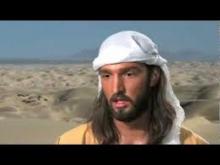
I finally sat down and watched the entire 11-plus minute video, Innocence of Muslims, which is at the heart of the recent outrage in Islamic countries in Yemen and north Africa. Suffice it to say, I lost a healthy share of brain cells in the process. The narrative – if you can call it that – is incoherent throughout, the sound is barely audible in places and the overall production values make the Annoying Orange series look like Scorsese.
That said, there’s plenty to anger Muslims in this clip, or anyone who values religious tolerance, plural coexistence, or even basic respect for human nature.
